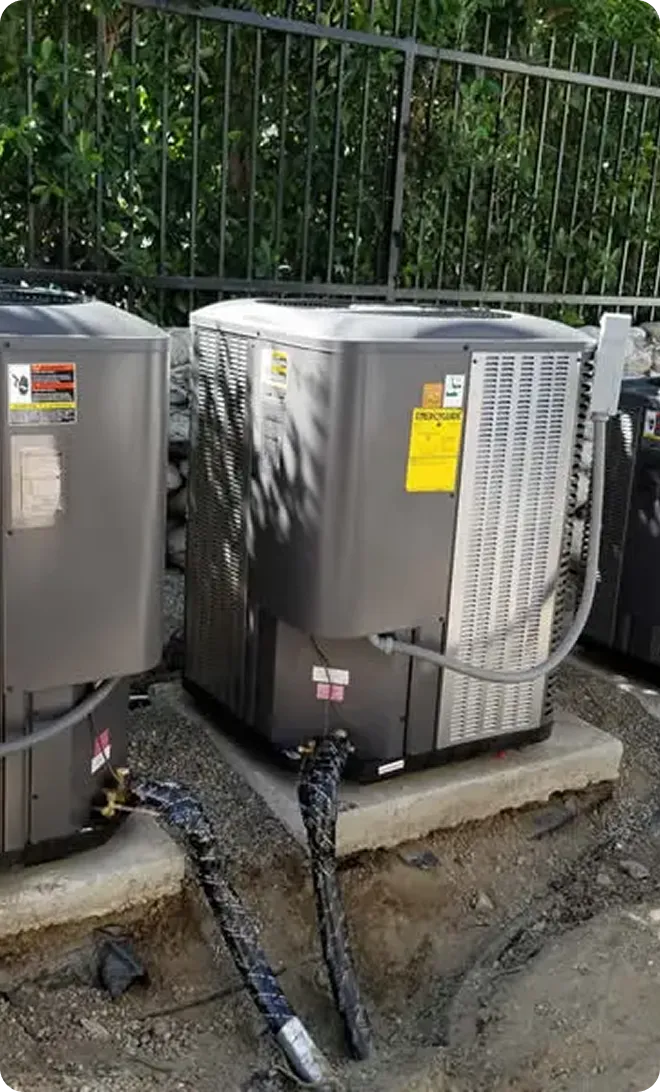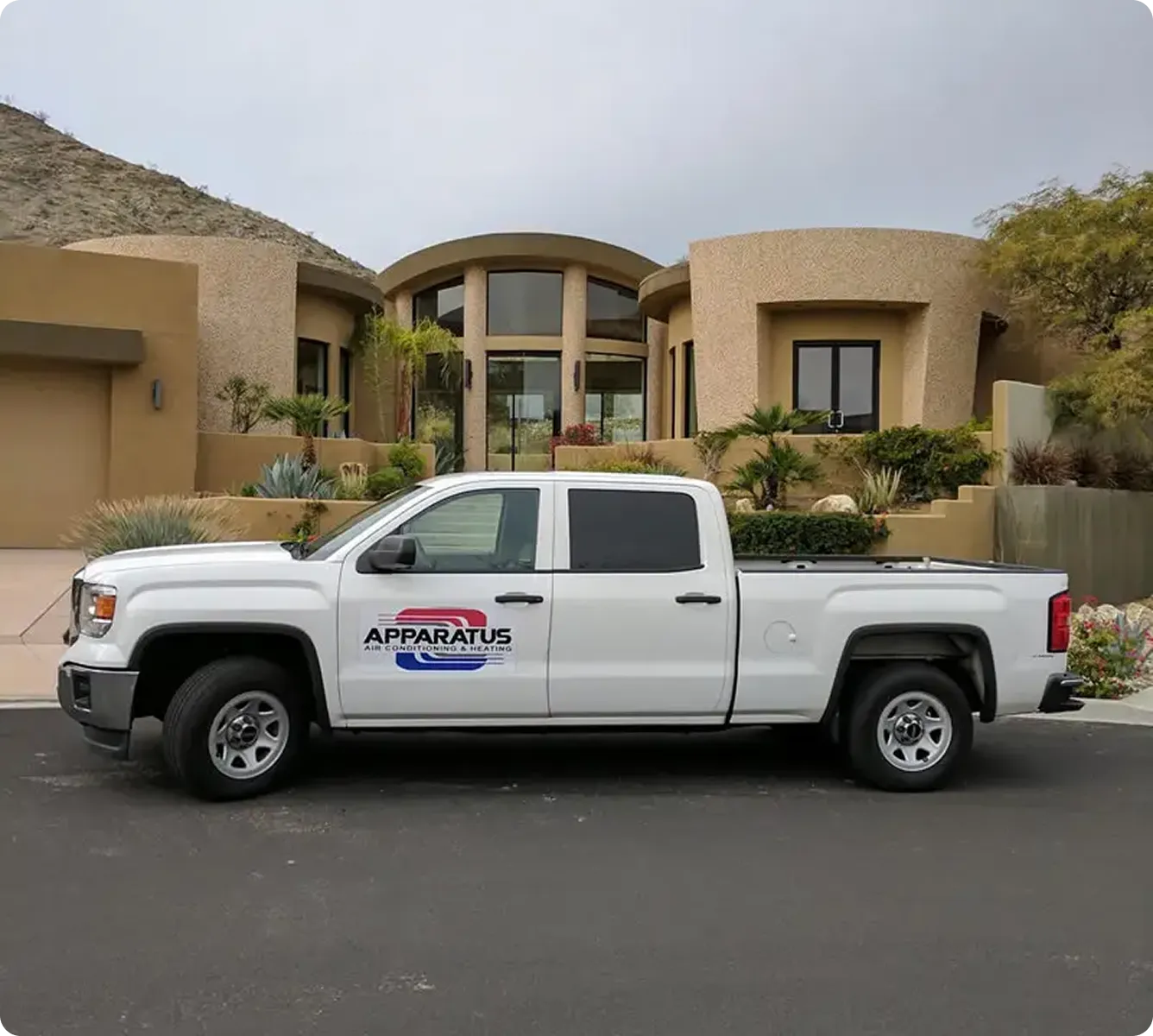
Heat Pump Maintenance in North Palm Springs, CA
Heat pump maintenance for North Palm Springs homes emphasizes proactive care to combat desert dust, heat, and monsoon conditions. Regular tune-ups reduce energy use, prevent mid-season breakdowns, preserve warranty coverage, and extend equipment life.
.jpg)
Heat Pump Maintenance in North Palm Springs, CA
Keeping your heat pump tuned and reliable is essential in North Palm Springs, CA, where long, hot summers, frequent dust, and occasional monsoon storms put heavy, year-round demand on HVAC systems. Regular heat pump maintenance reduces energy bills, prevents mid-season breakdowns, preserves warranty coverage, and extends equipment life — especially important for desert homes and rental properties that depend on consistent cooling.
Why routine heat pump maintenance matters in North Palm Springs
- High run-times from spring through fall increase wear on compressors, fans, and electrical components.
- Fine desert dust and sand rapidly clog filters and coat coils, reducing efficiency and causing icing or compressor strain.
- Sudden storms and seasonal humidity can clog condensate drains with algae or debris, leading to water damage or safety shutdowns.
- Vacation and rental properties often face intermittent use and less-obvious problems that grow into major failures without scheduled inspections.
Common heat pump issues in North Palm Springs, CA
- Clogged air filters and dusty coils causing reduced airflow and cooling capacity
- Low or incorrect refrigerant levels leading to higher energy use and compressor stress
- Dirty or blocked condensate lines and pans causing water backups or bacterial growth
- Electrical component wear: capacitors, contactors, and wiring degradation from heat
- Outdoor unit damage from sun exposure, debris, or pests nesting in the condenser
- Improper airflow or duct leakage that increases run time and uneven indoor comfort
Routine and seasonal maintenance programs
Heat pump maintenance should be tailored to North Palm Springs conditions and your usage pattern. Typical programs include:
- Spring pre-summer tune-up (recommended): ready the system for peak cooling season; focus on refrigerant, coils, and airflow.
- Fall pre-winter tune-up (recommended): ensure efficient heating mode operation, check reversing valve and defrost cycle, and inspect for monsoon season damage.
- Year-round plans: biannual inspections for most homes; quarterly checks for vacation rentals or high-use commercial units.
Programs usually vary by scope:
- Basic Tune-Up: core checks and filter replacement (annual).
- Standard Maintenance: biannual inspections, coil/condensate cleanings, basic diagnostics.
- Premium Service Agreement: biannual or quarterly visits, priority scheduling, detailed reporting, and preventive parts checks.
Heat pump tune-up checklist (what the technician will do)
Each visit follows a consistent checklist so you know exactly what was inspected and adjusted:
- Inspect and replace or clean air filters
- Clean evaporator and condenser coils to restore heat transfer
- Clear and sanitize condensate drains and pans; test drainage
- Measure airflow and check blower assembly for proper operation
- Check refrigerant levels and pressures; adjust charge if needed
- Test compressor and fan motor electrical loads (amps and voltage)
- Inspect and tighten electrical connections; test capacitors and contactors
- Verify thermostat calibration, controls, and reversing valve function
- Measure supply and return temperature split to confirm performance
- Inspect cabinet, refrigerant lines, and outdoor unit for corrosion, debris, or pest intrusion
- Lubricate moving parts where applicable and verify belt condition (if equipped)
- Record performance readings and recommended repairs or replacements
Diagnostic details explained in plain language
- Airflow measurement: Technicians measure how much air the system moves and inspect filters and ductwork. Restricted airflow reduces cooling capacity and can freeze coils.
- Refrigerant check: Proper refrigerant level is critical. Low charge forces the compressor to work harder, increasing energy use and shortening lifespan. Technicians use pressure and temperature checks to assess charge without excessive jargon.
- Electrical inspection: Heat and vibration loosen connections over time. Measuring voltage and amperage reveals stressed motors or failing capacitors before they burn out.
- Coil and condensate care: Clean coils reduce run time and energy use. Clearing the condensate path prevents water damage and microbial growth that can cause odors or health concerns.
Service agreement options and recommended frequency
Recommended frequency for North Palm Springs homes:
- Minimum: annual inspection for low-use properties
- Most homes: biannual maintenance (spring and fall) for cooling/heating readiness
- High-use, rental, or commercial: quarterly inspections are often best
Service agreements commonly include:
- Scheduled maintenance reminders and prioritized appointment windows
- Documented inspections and performance reports after each visit
- Discounted diagnostic time and spare parts for agreed clients
- Priority response during high-demand seasonal peaks
Sample maintenance report content
After each visit you should receive a clear, itemized report that typically includes:
- Date, technician name, and unit identification
- Checklist of completed tasks (filters, coils, drainage, electrical)
- Measured readings: pressure, temperature split, airflow notes, amp draws
- Observed issues and safety concerns
- Recommended repairs, parts replacements, and estimated urgency
- Notes on seasonal recommendations and next scheduled service window
How preventive care reduces total operating costs
- Improved efficiency: Clean coils and proper refrigerant reduce run time and energy consumption.
- Fewer emergency repairs: Early detection of worn parts prevents costly compressor or coil replacements.
- Longer equipment life: Regular lubrication, electrical checks, and clean components extend system life by minimizing stress and overheating.
- Stable indoor comfort: Consistent maintenance avoids temperature swings that force systems to run longer.
- Lower replacement risk during peak season: Well-maintained systems are less likely to fail when cooling demand is highest.
Local tips for North Palm Springs homeowners
- Replace or clean filters more often during the dry season when dust and pollen increase — sometimes monthly during peak dust.
- Shield outdoor units from direct afternoon sun where possible; shade reduces stress and improves efficiency.
- Inspect outdoor units after monsoon storms for debris, mud, or insect nests in the condenser.
- For vacation or rental homes, request an inspection before occupancy seasons to ensure reliability for guests.
Maintenance is an investment that pays back through lower utility bills, fewer surprises, and longer equipment life. Regular, documented heat pump tune-ups, timed for North Palm Springs conditions, provide predictable operating costs and reliable comfort all year.

hear what our satisfied
clients have to say









.webp)